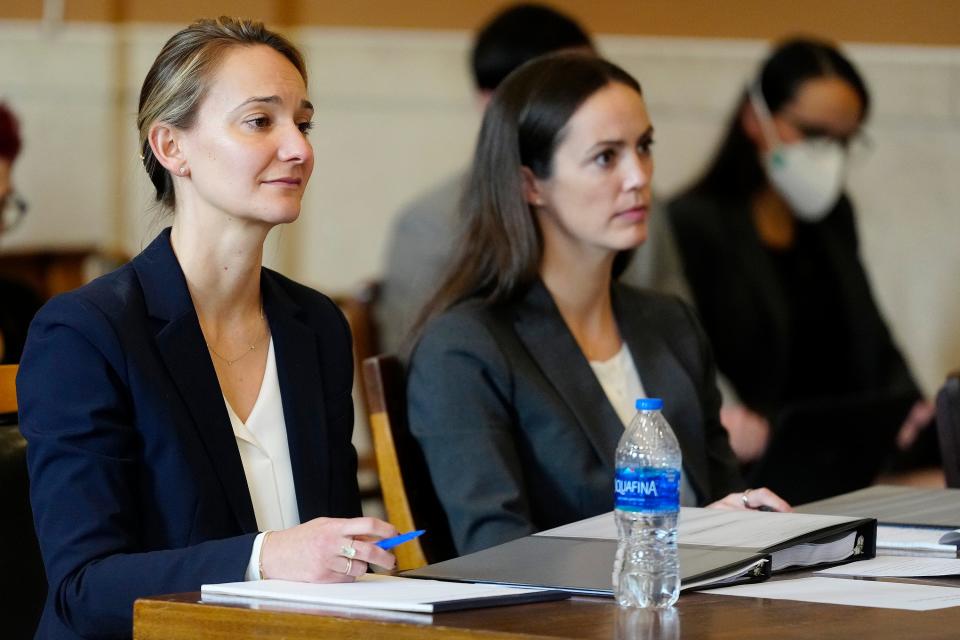Restrictive abortion laws in Arizona, Ohio put on hold; providers resume procedures

Judges in Ohio and Arizona put abortion bans on hold Friday in high-stakes cases in the national debate over the fate of abortion since Roe v. Wade was overturned, prompting providers to resume procedures.
An Ohio judge blocked the state’s six-week abortion ban indefinitely on Friday, and the state is expected to appeal the ruling.
Hamilton County Common Pleas Court Judge Christian Jenkins, a Democrat, granted a preliminary injunction to block Ohio’s law, which banned doctors from performing abortions after cardiac activity was detected. The law was in place for about three months after the U.S. Supreme Court overturned abortion protections.
“Does a law that prevents a cancer patient from getting lifesaving treatment infringe on those rights (in the Ohio Constitution)? The answer is obviously it does,” said Jenkins, adding that the state constitution goes beyond the U.S. Constitution in protecting liberty, safety and health care decisions. "Abortion is health care to which Ohioans have a right."
The ruling: Supreme Court overturns Roe v. Wade, eliminating constitutional right to abortion
The politics: Exclusive: Concern about abortion explodes among Democrats, fueling a push to vote
The ruling means abortion will be legal in Ohio until 20 weeks post-fertilization or 21 weeks and six days after the last period.
"We will wait and review the judge's actual written order and consult with the Governor's administration as far as next steps," Steve Irwin, a spokesman for Attorney General Dave Yost, said in a statement late Friday.
Meanwhile in Arizona, an appeals court on Friday temporarily put on hold the state's territorial-era abortion law, which banned nearly all abortions in the state, until a full appeal of an earlier ruling on it is heard. The procedure will presumably still be subject to a newer law that bans abortions after 15 weeks of pregnancy.
Planned Parenthood Arizona has a likelihood of succeeding in its effort to keep an injunction on the 1864 law that was in place since the 1973 Roe v. Wade decision, according to a unanimous ruling by a three-judge panel led by Presiding Judge Peter J. Eckerstrom.
The judges agreed with Planned Parenthood's argument that "Arizona courts have a responsibility to attempt to harmonize the state's" abortion laws. The 15-week law took effect last month.
'You're restricting her rights'
“I don’t think you could, with a straight face, disagree that you’re limiting her autonomy. You’re restricting her opportunities. You’re restricting her rights. You’re relegating her to a different status," Jenkins said during a daylong hearing in the Ohio case. “What endows you with the ability to make that judgment?”

At the heart of the debate was whether Ohio's ban on doctors performing abortions after cardiac activity is detected violates the state constitution. Jenkins previously put Ohio's six-week abortion ban on hold on a temporary basis.
The fallout: Abortion ruling's rapid impact: 66 clinics have stopped doing procedure in these 15 states
Dr. Dennis Sullivan, a bioethics expert from Cedarville University, a private, Baptist institution in Greene County, testified that Ohio's law is “consistent with good medical practice” and has exceptions to save the mother's life. He said that life begins at conception but later acknowledged that bioethicists and doctors can disagree.
Witnesses for Ohio's abortion clinics painted a picture of Ohio's abortion restrictions after Roe v. Wade was overturned. Victims of sexual assault were sent to other states to receive abortions. Pregnant people wailed as they learned they couldn't get an abortion here. One 25-year-old patient undergoing chemotherapy didn't qualify for an exception under state law, testified Dr. Sharon Liner, medical director of Planned Parenthood of Southwest Ohio.
Abortion in Ohio: 538 children in Ohio had abortions last year as total numbers increase
Clarification on Arizona laws needed, court says
The Arizona appellate judges wrote in their order Friday that an "acute need" to straighten out the state's abortion laws existed.
State Attorney General Mark Brnovich had asked the Pima County Superior Court to lift an injunction on the 1864 law following the U.S. Supreme Court's June decision that overturned Roe. Superior Court Judge Kellie Johnson granted that request Sept. 23. A week later, Johnson rejected a request to put her order on hold.
The state appellate court's Division Two overruled that decision Friday and granted the stay.

The territorial law mandates two to five years in prison for anyone who facilitates an abortion. Yet Gov. Doug Ducey maintains that a law he signed this year that allows abortion until 15 weeks of gestation — after which it's banned except to save the mother's life — supersedes the old law.
Brnovich sent a letter to Ducey in late September asking him to order the Legislature into a special session to give "clarity" to the two abortion laws.
Providers to resume abortions
Planned Parenthood Arizona's president and CEO, Brittany Fonteno, said in a statement that abortions in its clinics would resume. But she warned that the law could still be later ruled valid.
"While today's ruling brings temporary respite to Arizonans, the ongoing threat of this extreme, near-total abortion ban that has no regard for the health care of those across the state, including survivors of rape or incest, remains very real," Fonteno said.
A message seeking comment from Brnovich's office wasn't immediately returned.
Planned Parenthood of Greater Ohio also said it would again provide the procedure up until 15 weeks and six days.
Next steps in Ohio case
Yost is expected to appeal. The case would go to the First District Court of Appeals first before going to the Ohio Supreme Court. The Ohio Supreme Court currently includes four Republican and three Democratic justices, but the balance of the court and its leadership is up for grabs in this November's election.
"We are saddened yet not surprised by this so-called decision," Ohio Right to Life President Mike Gonidakis said. "The abortion clinics literally forum-shopped to get the outcome they wanted. This is a moment in time for the pro-life movement and we are convinced that the Ohio Supreme Court will overturn this ruling."
Meanwhile, GOP lawmakers are crafting legislation to ban nearly all abortions in the state. That bill won't be introduced until after the election.
“Today we will celebrate this win in the battle for bodily autonomy and health care for all, but our work is far from over," said Iris Harvey, CEO and president of Planned Parenthood of Greater Ohio, and Kersha Deibel, CEO of Planned Parenthood of Southwest Ohio, in a joint statement.
This article originally appeared on USA TODAY: Abortion in Ohio, Arizona: Abortion bans on hold, abortions to resume

 Yahoo Movies
Yahoo Movies 